PLN Book Store
Please note that we do not provide refunds for PLN book orders after they are placed, and are not responsible for incorrect mailing addresses or address changes due to errors made when placing an order. If you place a book order for a prisoner and it is not received, please first check with the facility's mail room before contacting us. All of our book orders ship with tracking numbers, and all of our books are softcover.
Categories
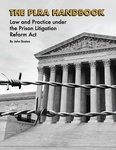 The PLRA Handbook: Law and Practice Under the Prison Litigation Reform Act
The PLRA Handbook: Law and Practice Under the Prison Litigation Reform Act
$224.99
This is pricing for professionals (lawyers, prison libraries, law firms, etc.). Please click this link for prisoners' pricing.
576 Pages
ISBN: 979-8-9854138-0-9
By John Boston
The PLRA Handbook is the best and most thorough guide to the PLRA in existence and provides an invaluable roadmap to all the complexities and absurdities it raises to keep prisoners from getting rulings and relief on the merits of their cases. The goal of this book is to provide the knowledge prisoners’ lawyers – and prisoners, if they don’t have a lawyer – need to quickly understand the relevant law and effectively argue their claims.
Anyone involved in federal court prison and jail litigation needs The PLRA Handbook – lawyers, judges, court staff, academics, and especially, pro se litigants.
Although the PLRA Handbook is intended primarily for litigators contending with the barriers the PLRA throws up to obtaining justice for prisoners, it’ll be of interest and informative for anyone wishing to learn how the PLRA has been applied by the courts and how it has impacted the administration of justice for prisoners. It is based primarily on an exhaustive review of PLRA case law and contains extensive citations.
John Boston is best known to prisoners around the country as the author, with Daniel E. Manville, of the Prisoners’ Self-Help Litigation Manual – commonly known as the “bible” for jailhouse lawyers and lawyers who litigate prison and jail cases. He is widely regarded as the foremost authority on the PLRA in the nation.
“If prisoners will review The PLRA Handbook prior to filing their lawsuits, it is likely that numerous cases that are routinely dismissed will survive dismissal for failure to exhaust.”
— Daniel E. Manville, Director, Civil Rights Clinic
Read more
 The Habeas Citebook:Ineffective Assistance of Counsel-2nd Edition
The Habeas Citebook:Ineffective Assistance of Counsel-2nd Edition
$49.95
Newly Updated Second Edition Now Available!
Paperback, 275 pages. Written by Brandon Sample and Alissa Hull; edited by Susan Schwartzkopf
Prison Legal News Publishing (2016). ISBN 978-0-9819385-4-7
The Habeas Citebook is a nifty and concise self-help guide for prisoners seeking habeas relief based on claims of ineffective assistance of counsel. Navigating the complex and treacherous terrain of habeas law is never easy; but claiming that your lawyer screwed up is even more difficult - especially from the confines of an ill-equipped prison law library. But Brandon Sample has provided an amazing and much-needed tool for prisoners who are forced to seek relief on their own. The book is thorough, but simple and readable. It starts with a wonderfully well-organized listing of hundreds of different types of ineffective assistance of counsel, set forth in the form of citations to court rulings - a novel approach that not only acts as a springboard for further research but also saves the prisoner countless hours of preliminary research. The book is also practical and useful. It provides invaluable resources, including templates and forms, that explain what, when, where and how to file for habeas relief. It contains readable summaries of the relevant laws and rules and plain-English explanations of some of the inherently mystifying concepts of habeas law, such as “procedural default” and “certificates of appealability” and the “AEDPA.” It includes practical advice on what to do and what not to do on issues such as identifying and selecting the claims to be argued; seeking discovery and evidentiary hearings; and seeking the appointment of counsel. And the book consistently offers critical insights on winning court strategies. In short, the Habeas Citebook is an essential resource for any would be jail-house lawyer. Peter Schmidt, Publisher Punch & Jurists
ISBN-10: 0981938515ISBN-13: 978-098193851
Read more
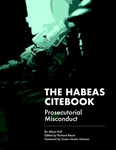 The Habeas Citebook: Prosecutorial Misconduct
The Habeas Citebook: Prosecutorial Misconduct
$59.95
The Habeas Citebook: Prosecutorial Misconduct, by Alissa Hull is the latest offering in Prison Legal News Publishing’s Citebook series. Like the other Citebooks in the series, it’s designed to help pro se prisoner litigants to identify and raise viable claims for potential habeas corpus relief. This invaluable tool contains several hundred case citations and descriptions, saving readers many hours of research in identifying winning arguments to successfully challenge their conviction.
It’s conveniently and logically organized into 16 chapters, beginning with a general overview of prosecutorial misconduct and progresses topically to discussing and providing case citations to specific issues such as Brady considerations and discriminatory jury selection. This book provides readers with a law library’s worth of pertinent case law right at their fingertips. It explains the procedural and substantive complexities of federal habeas corpus litigation with the goal of identifying and litigating claims based upon prosecutorial misconduct.
The Habeas Citebook includes examples of actual petitions that have been filed in both state and federal court. In addition, it contains a handy glossary of terms commonly encountered when preparing a habeas petition, a map and addresses of the various federal courts, and a Case Law Citation Index for quick reference. This book is truly an invaluable resource for anyone thinking about mounting a challenge to his or her conviction via a habeas petition alleging prosecutorial misconduct.
ISBN-13: 978-0-9819385-5-4
Read more
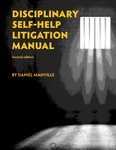 Disciplinary Self Help Litigation Manual
Disciplinary Self Help Litigation Manual
$49.95
Paperback, 355 pages. By Daniel Manville.
Prison Legal News Publishing (2015).
The Disciplinary Self-Help Litigation Manual, Second Edition, by Dan Manville, is the third in a series of books by Prison Legal News Publishing. It is designed to inform prisoners of their rights when faced with the consequences of a disciplinary hearing. This authoritative and comprehensive work educates prisoners about their rights throughout this process and helps guide them at all stages, from administrative hearing through litigation.
This invaluable how-to guide offers step by step information for both state and federal prisoners and includes a 50 state analysis of relevant case law. It is a specialized supplement to the Prisoners’ Self-Help Litigation Manual, often referred to as the “bible” for jailhouse lawyers. This book proves to be just as essential for prisoners. While directed at pro se prisoner litigants it is extremely useful to lawyers whose clients are subject to penal disciplinary systems. It includes an extensive case law citation index. This important new edition is undeniably a vital tool and ‘must have’ for the serious prisoner rights litigator.
Reviews
Fighting a disciplinary ticket alone can be daunting. The Disciplinary Self-Help Litigation Manual, Second Edition is an essential tool for anyone facing this challenge. Written and published by people who have been there and defended unjustified accusations and successfully appealed adverse results, this book provides tools that are specific and direct. Disciplinary timelines are demanding. The step by step guidance that describes what is necessary to prepare for and present at the hearing is crucial. State-by-state information guides one quickly to relevant laws and regulations. This book will save time in every sense of the word. I recommend it to prisoners and lawyers as the most thorough and valuable resource on the topic. -- Brett Dignam
The stakes in prison disciplinary proceedings are high. If found guilty, prisoners may face prolonged solitary confinement, loss of important amenities like family visiting, and even forfeiture of good time credits, resulting in more time behind bars. To defend themselves effectively, prisoners need to know their rights. The Disciplinary Self-Help Litigation Manual, Second Edition is an indispensable resource, both for prisoners facing disciplinary charges and for lawyers assisting them. I recommend it highly. -- David Fathi
ISBN-13: 978-0-981938523
Read more
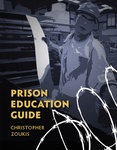 Prison Education Guide
Prison Education Guide
$24.95
Prison Legal News Publishing (2016).
Paperback, 269 pages. Written by Christopher Zoukis and edited by Susan Schwartzkopf.
Prison Education Guide, by Christopher Zoukis, is the fourth in a series of books by Prison Legal News Publishing. It is the most comprehensive guide to correspondence programs for prisoners available today. This exceptional book provides the reader with step-by-step instructions to find the right educational program, enroll in courses and complete classes to meet their academic goals. It is perfect for the incarcerated student who lacks Internet access or the ability to attend education classes in person. Prison Education Guide is the latest and best resource on the market for the incarcerated nontraditional student. It includes a detailed analysis of the quality, cost, and course offerings of all college correspondence programs available to prisoners. In a time when so many academic opportunities in prisons have been eliminated, this book is an invaluable reentry tool for prisoners who seek to further their education while incarcerated and to help them prepare for life and work following their release.
ISBN-10:0-9819385-3-1
ISBN-13:978-0-9819385-3-0
Read more
 Prisoners' Self Help Litigation Manual, 4th Edition
Prisoners' Self Help Litigation Manual, 4th Edition
$69.95
Paperback, 928 pages. By John Boston and Daniel Manville. Published by Oxford University Press. Prisoners' Self-Help Litigation Manual, in its much-anticipated fourth edition, is an indispensable guide for prisoners and prisoner advocates seeking to understand the rights guaranteed to prisoners by law and how to protect those rights. Clear, comprehensive, practical advice provides prisoners with everything they need to know on conditions of confinement, civil liberties in prison, procedural due process, the legal system, how to litigate, conducting effective legal research, and writing legal documents. Written by two legal and penitentiary experts with intimate knowledge of prisoner's rights and legal aid work, authors John Boston and Daniel E. Manville strategically focus on federal constitutional law, providing prisoners and those wishing to assist them with the most important information concerning legal rights. Over the past decade, prison law and conditions have changed significantly. This new edition is updated to include the most relevant prisoners' rights topics and approaches to litigation. Updates include all aspects of prison life as well as material on legal research, legal writing, types of legal remedies, and how to effectively use those remedies. Certainly the most authoritative, well-organized and relevant prisoner's rights manual available - - the eagerly awaited fourth edition should be purchased by everyone interested in civil rights for the incarcerated.
Features * A best-selling book in all three of the previously released editions, the fourth edition is updated to include the most relevant prisoner's rights topics and approaches to litigation for those currently facing incarceration.
* Prisoners' Self-Help Litigation Manual, 4th Edition is a comprehensive tool for learning about prisoner's civil rights, and providing the necessary information and background to formulate a strong legal self-defense for those rights.
* Written by two legal and penitentiary experts with intimate knowledge of prisoner's rights and legal aid work. Mr. Manville has successfully formulated and argued in his own prisoner's civil rights litigation.
* Expert advice on civil liberties in prison (conditions and practices, property, medical care, freedom of expression, privacy, religion, access to the courts, and more), procedural due process, equal protection of the laws, pre-trial detainees' rights, the court system, actions , defenses, and relief, how to litigate, legal research, and writing legal documents.
* With the current issues of prison overcrowding and incidents of prison violence, it is of vital importance for prisoners and their families to possess the knowledge of a prisoner's civil rights. The Prisoner's Self-Help Litigation Manual, 4th Edition, outlines the rights as well as legal remedies for abuses of those rights. John Boston is Director of the Prisoners' Rights Project of the New York City Legal Aid Society. Mr. Boston received his undergraduate degree from Vanderbilt University and earned his J.D. from New York University School of Law. He began his career as a research coordinator for The Defender Project of the Twentieth Century Fund in New York City. He has also contributed research and writing concerning prison population issues for the Correctional Association of New York and began his tenure as the Legal Aid Society as a staff attorney. Mr. Boston is widely published, with numerous articles on prisoners, their rights and circumstances nationwide, and has litigated several cases pertaining to prisoner's rights. He also participated in a national working group with the ACLU in response to the Prison Litigation Reform Act, reviewing briefs and pleadings, consulting with prisoner advocates, preparing CLE and practice materials. He is on the faculty of the Practicing Law Institute and co-administrator of the Prisoners' Rights section of the website www.probono.com. Daniel E. Manville is an attorney specializing in civil rights litigation. Mr. Manville has a Bachelor in Science from Central Michigan University (1976); a Bachelor Degree in General Studies from Wayne State University (1976); a Juris Doctorate from Antioch School of Law (now University of District of Columbia Law School) (1981); a Master in Criminal Justice, Michigan State University (1985). From 1988 through 2003, he was in private practice concentrating on providing representation to prisoners. From 2003 to summer of 2007, Manville was the Clinical Staff Attorney for Wayne State University Civil Rights Litigation Clinic. During 2007 and 2008 academic year, Manville was a Visiting Professor at University of Denver Law School Civil Rights Clinic. He is also an author and co-author of a number of self-help litigation manuals for prisoners; a number of articles on rights of prisoners; and co-author of A Prisoner's Rights, 2005 Annual Survey of Michigan Law, 2005 Wayne Law Review.
ISBN13: 9780195374407 ISBN10: 0195374401
Read more
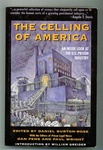 The Celling of America: An Inside Look at the U.S. Prison Industry
The Celling of America: An Inside Look at the U.S. Prison Industry
$24.95
263 pages. Edited by Daniel Burton Rose, Dan Pens and Paul Wright. Common Courage (1998). The Celling of America presents a detailed inside look at the workings of the American law enforcement system. The book examines the death penalty, control units, the politics of prisoner bashing, the role of the media in the current anti-prisoner climate, prisoner struggles, prison slave labor, racism, brutality and corruption among prison employees, the role of the gun lobby and the guard unions in formulating law enforcement policy, the downward spiral of prison conditions, private prisons and much, much more. Editorial Review by Amazon.com In The Celling of America, inmates in American penitentiaries report on their living conditions and political concerns. They paint a bleak picture of the prison system, describing police brutality, substandard medical care, racism, and extremely crowded conditions. They discuss privately-run prisons, prison labor, weightlifting, and the effect of television on prisoner's lives. Many of them believe conditions are getting worse every year, and their claims are quite credible because no one knows jail like a convict. Most of these articles originally appeared in Prison Legal News, a magazine published by Dan Pens and Paul Wright, two incarcerated men in Washington state. The authors explain that reporters often rely on prison officials as the primary source for information on these issues, which leads them to present a biased view of prison life. State prisons limit and sometimes block prisoners' access to media, making it difficult, if not impossible, for prisoners to tell their side of the story. Inmates are easy targets for politicians because they aren't allowed to vote and can't talk back. These essays compel readers to reevaluate their ideas about the average prison inmate, to think more carefully about that man lounging in his cell watching television. It was interesting to learn that while some states provide each prisoner with a television on the theory that television pacifies people, other prison systems forbid televisions because some believe watching television is a luxury that inmates don't deserve. The book would have been better if it had told more about the people who wrote the essays. I kept wondering what each writer did to end up in the slammer, and that information seems significant. Do you trust a thief to tell you about multinational corporations profiting from cheap prison labor? Do you trust a sex offender? Who do you believe? That is one of the central questions posed by this collection. --Jill Marquis
ISBN-10: 0415935385 ISBN-13: 978-0415935388
Read more
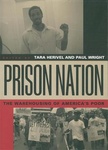 Prison Nation: The Warehousing of America's Poor
Prison Nation: The Warehousing of America's Poor
$54.95
332 pages. Edited by Tara Herivel and Paul Wright Routledge (2003). Prison Nation is a distant dispatch from a foreign and forbidden place--the world of America's prisons. Written by prisoners, social critics and luminaries of investigative reporting, Prison Nation testifies to the current state of America's prisoners' living conditions and political concerns. These concerns are not normally the concerns of most Americans, but they should be. From substandard medical care, to the inadequacy of resources for public defenders, to the death penalty, the issues covered in this volume grow more urgent every day. Articles by outstanding writers such as Mumia Abu-Jamal, Noam Chomsky, Mark Dow, Judy Green, Tracy Huling, and Christian Parenti chronicle the injustices of prison privatization, class and race in the justice system, our quixotic drug war, the rarely discussed prison AIDS crisis, and a judicial system that rewards mostly those with significant resources or the desire to name names. Correctional facilities have become a profitable growth industry for companies like Wackenhut that run them and companies like Boeing that use cheap prison labor. With fascinating narratives, shocking tales, and small stories of hope, Prison Nation paints a picture of a world many Americans know little or nothing about.
ISBN-10: 0415935385 ISBN-13: 978-0415935388
Read more
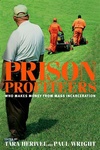 Prison Profiteers: Who Makes Money from Mass Incarceration
Prison Profiteers: Who Makes Money from Mass Incarceration
$24.95
323 pages. Edited by Tara Herivel and Paul Wright. New Press (2009). This is the third and latest book in a series of Prison Legal News anthologies that examines the reality of mass imprisonment in America. [The other two titles are The Celling of America: An Inside Look at the US Prison Industry and Prison Nation: The Warehousing of America's Poor, both available from PLN]. Prison Profiteers is unique from other books on the market because it exposes and discusses who profits and benefits from mass imprisonment, rather than who is harmed by it and how. Why is sentencing reform dead on arrival in every state legislature and congress? What is the biggest transfer of public wealth into private hands in recent history? Read Prison Profiteers and you will know! Hint: It has to do with prisons. Positive: With the baby boomlet demographics, we foresee increasing demand for juvenile [incarceration] services. Negative: . . . it is often difficult to maintain the occupancy rates required for profitability. —FROM A REPORT PRODUCED FOR THE PRIVATE PRISON INDUSTRY BY INVESTMENT ANALYSTS FIRST ANALYSIS SECURITIES CORPORATION Locking up 2.3 million people isn’t cheap. Each year federal, state, and local governments spend over $185 billion annually in tax dollars to ensure that one out of every 137 Americans is imprisoned. Prison Profiteers looks at the private prison companies, investment banks, churches, guard unions, medical corporations, and other industries and individuals that benefit from this country’s experiment with mass imprisonment. It lets us follow the money from public to private hands and exposes how monies formerly designated for the public good are diverted to prisons and their maintenance. Find out where your tax dollars are going as you help to bankroll the biggest prison machine the world has ever seen. Contributors include: Judy Greene on private prison giants Geo (formerly Wackenhut) and CCA; Anne-Marie Cusac on who sells electronic weapons to prison guards; Wil S. Hylton on the largest prison health care provider; Ian Urbina on how prison labor supports the military; Kirsten Levingston on the privatization of public defense; Jennifer Gonnerman on the costs to neighborhoods from which prisoners are removed; Kevin Pranis on the banks and brokerage houses that finance prison building; and Silja Talvi on the American Correctional Association as a tax-funded lobbyist for professional prison bureaucracies; Tara Herivel on juvenile prisons; Gary Hunter and Peter Wagner on the census and counting prisoners; David Reutter on Florida's prison industries; Alex Friedmann on the private prisoner transportation industry; Paul Von Zielbauer on the sordid history of Prison Health Services in New York; Steven Jackson on the prison telephone industry; Samantha Shapiro on religious groups being paid to run prisons and Clayton Mosher, Gregory Hooks and Peter Wood on the myth and reality of building rural prisons. Tara Herivel is the co-editor of Prison Nation. She is a prisoner rights attorney and the author of numerous articles in the alternative press. She lives in Portland, Oregon. Paul Wright is the founder and editor of Prison Legal News and co-editor of Prison Nation and The Celling of America. He lives in Lake Worth, Florida. This is an exclusive paperback printing made just for Prison Legal News.
ISBN-10: 1595584544ISBN-13: 978-159558454
Read more
 Win Your Case
Win Your Case
$21.95
287 pages. St. Martin's Griffin-publisher
Gerry Spence is perhaps America's most renowned and successful trial lawyer, a man known for his deep convictions and his powerful courtroom presentations when he argues on behalf of ordinary people. Frequently pitted against teams of lawyers thrown against him by major corporate or government interests, he has never lost a criminal case and has not lost a civil jury trial since l969. In Win Your Case, Spence shares a lifetime of experience teaching you how to win in any arena-the courtroom, the boardroom, the sales call, the salary review, the town council meeting-every venue where a case is to be made against adversaries who oppose the justice you seek. Relying on the successful courtroom methods he has developed over more than half a century, Spence shows both lawyers and laypersons how you can win your cases as he takes you step by step through the elements of a trial-from jury selection, the opening statement, the presentation of witnesses, their cross-examinations, and finally to the closing argument itself. Spence teaches you how to prepare yourselves for these wars. Then he leads you through the new, cutting-edge methods he uses in discovering the story in which you form the evidence into a compelling narrative, discover the point of view of the decision maker, anticipate and answer the counterarguments, and finally conclude the case with a winning final argument. To make a winning presentation, you are taught to prepare the power-person (the jury, the judge, the boss, the customer, the board) to hear your case. You are shown that your emotions, and theirs, are the source of your winning. You learn the power of your own fear, of honesty and caring and, yes, of love. You are instructed on how to role-play through the use of the psychodramatic technique, to both discover and tell the story of the case, and, at last, to pull it all together into the winning final argument.Whether you are presenting your case to a judge, a jury, a boss, a committee, or a customer, Win Your Case is an indispensable guide to success in every walk of life, in and out of the courtroom.
ISBN-13: 978-0-312-36067-2
Read more
 Writing to Win: The Legal Writer
Writing to Win: The Legal Writer
$19.95
303 pages. By Steven D. Stark. Three Rivers Press (April 2012). Explains the writing of effective complaints, responses, briefs, motions and other legal papers. From the Publisher: From a master teacher and writer, a fully revised and updated edition of the results-oriented approach to legal writing that is clear, that persuades--and that WINS. More than almost any profession, the law has a deserved reputation for opaque, jargon-clogged writing. Yet forceful writing is one of the most potent weapons of legal advocacy. In this new edition of Writing to Win, Steven D. Stark, a former lecturer on law at Harvard Law School, who has inspired thousands of aspiring and practicing lawyers, applies the universal principles of powerful, vigorous prose to the job of making a legal case--and winning it. Writing to Win focuses on the writing of lawyers, not judges, and includes dozens of examples of effective (and ineffective) real-life legal writing--as well as compelling models drawn from advertising, journalism, and fiction. It deals with the challenges lawyers face in writing, from organization to strengthening and editing prose; offers incisive ways of improving arguments; addresses litigation and technical writing in all its forms; and covers the writing attorneys must perform in their daily practice, from email memos to briefs and contracts. Each chapter opens with a succinct set of rules for easy reference. With new sections on client communication and drafting affidavits, as well as updated material throughout, Writing to Win is the most practical and efficacious legal-writing manual available.
ISBN-10: 0307888711 ISBN-13: 978-0307888716
Read more
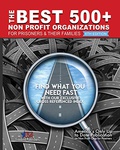 The Best 500 Non-Profit Organizations-6th Edition
The Best 500 Non-Profit Organizations-6th Edition
$19.99
Freebird Publishers
America's only up-to-date comprehensive print resource of non-profit organizations specifically for prisoners and their families. This book lists the organizations with descriptions of what each one offers. It's cross referenced by states, organization names and subjects. Finds what you want fast!
ISBN-13: 9781952159404
Read more
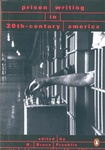 Prison Writing in 20th Century America
Prison Writing in 20th Century America
$16.00
368 pages. Edited by H. Bruce Franklin. Viking Penguin (1998). From Jack London to Iceberg Slim, George Jackson and Assatta Shakur, this powerful anthology provides a selection of some of the best writing describing life behind bars in America. From The Publisher: This unique collection dramatizes the history of the modern American prison and offers a harrowing vision of prison life in America today. H. Bruce Franklin, a leading authority on American prison writing, has gathered more than sixty selections from some of the most powerful works - memoirs, stories, novels, poems written in the last hundred years. Reviews From Publisher's Weekly - Publishers Weekly Harrowing in their frank detail and desperate tone, the more than 60 selections in this anthology of writings about the prison experience in America pack an emotional wallop. According to Wicker's outspoken foreword, "prisons and the violence and despair they symbolize... are a blot on American life and history." The U.S. penal system contains a population greater than that of New Hampshire, and even the pretense of rehabilitation was long ago subsumed by the need to punish. Beginning with accounts of the victims of Jim Crow and Black Code laws in the segregationist South and going through the contemporary journalism of Dannie Martin and Mumia Abu-Jamal, these views from behind the bars should be required reading for anyone concerned about the violence in our society and the high rate of recidivism. Franklin, in his introduction, argues that the institution of slavery has its modern counterpart in penal servitude While he sometimes seems stuck in the clichs of a New Left rhetoric, he has done a fine job of rediscovering the prison writers of the 1920s (a period of real flowering among convict writers, supported by H.L. Mencken's American Mercury magazine) like Jim Tully, Chester Himes and Ernie Booth. In this context, the more famous works of writers such as Nelson Algren, Malcolm X and Jack Henry Abbot, gain a fuller resonance. The book also highlights writers, like Piri Thomas, who are alive today but neglected. If the test of an anthology is whether it makes the reader want to pursue the works of the authors it presents, this provocative volume definitely qualifies.
ISBN-10: 0140273050 ISBN-13: 978-0140273052
Read more
 The Criminal Law Handbook: Know Your Rights, Survive the System
The Criminal Law Handbook: Know Your Rights, Survive the System
$44.99
634 pages. Attys. Paul Bergman & Sara Berman. NOLO (16th Edition, 2020). Explains what happens in a criminal case from being arrested to sentencing, and what your rights are at each stage of the process. Uses an easy to understand question and answer format. From The Publisher: For anyone who's come face to face with the criminal justice system, this handbook is the place to turn for answers. In an easy-to-follow, question-and-answer format it covers talking to police, searches, and seizures, drunk driving, arrests, booking, bail, criminal defense lawyers, lineups, preliminary hearings, trials, plea bargains, common defense, evidence, sentencing, and much more. No other resource available for lay people is as comprehensive or clear in explaining exactly what goes on in criminal cases. Reviews From Library Journal An excellent and balanced guide to the state court criminal justice process, this book does not detail the differences of being charged in federal court, such as federal sentencing guidelines. Authors Bergman (Reel Justice, LJ 6/1/96) and Berman-Barrett, also a criminal attorney, use a question-and-answer format to cover cases from police investigations through appeals. The book is not intended to replace legal advice, and the authors stress the importance of obtaining representation, unlike Michael Saeger in Defend Yourself Against Criminal Charges (LJ 10/1/97), a recent, inferior guide. A worthy addition to all libraries that will instruct those interested in the criminal justice system. --Harry Charles, St. Louis
ISBN-10: 1413327199 ISBN-13: 978-1413327199
Read more
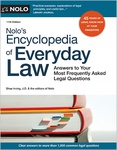 Nolo's Encyclopedia of Everyday Law
Nolo's Encyclopedia of Everyday Law
$34.99
The law affects practically every aspect of our lives, and legal questions come up daily. When they do, turn to Nolo’s Encyclopedia of Everyday Law, a handy, information-packed resource.
Written by Nolo’s expert team of attorneys, this book answers hundreds of the most frequently asked questions about everyday legal issues. And it does so in plain English with no mind-numbing legalese. Topics include:
• Credit & debt
• Privacy rights
• Workplace rights
• Child custody & support
• Wills & trusts
• Elder care
• Buying a house
• Bankruptcy
• Small claims court
• Home businesses
• Domestic violence
• Name changes
• Adoption
• Searches & seizures
•Traffic Accidents
• Tenants’ rights
• Inventions
• Criminal law
The 11th edition is completely updated to reflect the latest laws, government agency contacts, and resources. There’s also a helpful glossary of legal terms and an appendix on how to do your own legal research.
Read more
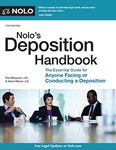 Nolo's Deposition Handbook
Nolo's Deposition Handbook
$34.99
440 pages. Nolo Press (2018). Take the mystery out of your deposition with this comprehensive guide. Getting deposed? Here's the book you need. Nolo's Deposition Handbook is for anyone who will conduct a deposition or will be deposed; providing all the information, tips and instructions you need whether or not you're represented by a lawyer. Packed with concrete suggestions and examples, the book explains how to: * arrange a convenient date * prepare for the deposition * respond to questions with aplomb * ask the right questions You'll even learn the three "golden rules" for answering questions and the trick questions lawyers often use to influence testimony. Written by two UCLA law professors and attorneys, Nolo's Deposition Handbook provides all the information you need to sail through the deposition process with confidence. A perfect book for law students, lawyers, legal assistants, witnesses, expert witnesses and people who represent themselves in court.
ISBN-10: 1413325621 ISBN-13: 978-1413325621
Read more
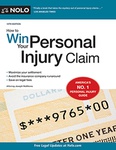 How to Win Your Personal Injury Claim
How to Win Your Personal Injury Claim
$34.99
Joseph Matthews, Attorney
419 pages. October 2018, 10th Edition.
Know your rights! Find out how to make the best case for yourself and win your personal injury claim. Dealing with insurance companies and lawyers when filing a personal injury claim can feel like another accident is in the offing. But you can handle a claim yourself -- and save hundreds or thousands of dollars in the process. How to Win Your Personal Injury Claim shows you how to handle almost every accident situation, and guides you through the insurance claim process, step by step. Learn how to: * Protect your rights after an accident * Determine what your claim is worth * Handle a property-damage claim * Deal with uncooperative doctors, lawyers and insurance companies * Counter the special tactics insurance companies use * Prepare a claim for compensation * Negotiate a full and fair settlement * Stay on top of your case if you hire a lawyer The completely updated 7th edition of How to Win Your Personal Injury Claim provides your state's most recent laws, small-claims court limits and Department of Insurance contact information. Plus, you'll find an all-new chart explaining your state's in-car text and cell phone laws.
ISBN-10: 9781413317169ISBN-13: 978-1413317169
Read more
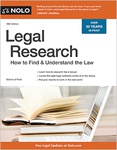 Legal Research: How to Find and Understand the Law
Legal Research: How to Find and Understand the Law
$49.99
356 pages. By Stephen Elias & the Editors of Nolo (18th Edition, 2018).
Legal Research is a comprehensive and easy to understand guide on researching the law and what it means. It explains case law, statutes, digests and much more, and it includes information on how to do legal research on the internet. It also contains review questions and practice research problems. This book is ideal for pro se litigants, paralegals and law students, and it is a must for libraries. From the Publisher: Legal Research provides a systematic research method to find answers and get results; whether you're looking for background information, seeking a specific regulation or case; or searching for a complete answer to a complex legal question. Learn how to read and understand statutes, regulations and cases; check your research to make sure it's up to date, then organize your research results into a memorandum of law.. "Or ... skip the library and go to the Net! You can tackle many research tasks by going online. With the seventh edition of Legal Research, Nolo shows you how to use the Web to find statutes, cases, background information and answers to specific legal questions. What People Are Saying This book remains the best single introduction...to the mysterious world of legal research. Law Librarian, University of California, Berkeley, Robert C. Berring
ISBN-10: 1413325645 ISBN-13: 978-1413325645
Read more
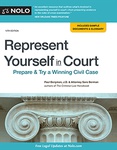 Represent Yourself in Court: How to Prepare & Try a Winning Case
Represent Yourself in Court: How to Prepare & Try a Winning Case
$39.99
584 pages. Attys. Paul Bergman & Sara Berman. Nolo (10th Edition, 2019). Breaks down the trial process in easy-to-understand steps so you can effectively represent yourself in court. The authors explain what to say, in court, how to say it, where to stand, etc. From The Publisher: For people dealing with a personal injury claim, a landlord-tenant dispute, a small business disagreement or any of the dozens of other possible legal muddles, this book points the way through the complexities of the court system. It shows how to analyze the legitimacy of a case, make an opening statement, line up persuasive witnesses, present testimony in court, cross-examine opponents and even pick a jury. Includes a chapter dealing with the specifics of handling a divorce, child custody or child support action. Reviews From Library Journal
The nuts and bolts of self-representation in court are presented in this detailed, sensible book. The authors describe the legal process from the investigation of the case through the collection of a judgment, with an emphasis on what happens in the courtroom. Bergman and Berman-Barrett share the procedures and methods a lay person needs to survive in an environment that is not necessarily friendly to non-attorneys. Understanding that in the law the devil is in the details, they take pains to avoid oversimplification, and they do an equally good job of illuminating concepts like burden of proof and procedures like marking and identifying exhibits. The authors highlight important information with icons that alert the reader to a practical suggestion, warn of a potential problem, or refer to other resources on the subject. Highly recommended for even modest legal self-help collections, including those that already own Robert Schachner's How and When To Be Your Own Lawyer (LJ 3/1/ 93).-Joan Pedzich, Harris, Beach & Wilcox, Rochester, N.Y
ISBN-10: 1413326611 ISBN-13: 978-1413326611
Read more
 Merriam Webster's Dictionary of Law
Merriam Webster's Dictionary of Law
$19.95
634 pages.Merriam-Webster (2016)
Includes definitions for more than 10,000 legal words and phrases, plus pronunciations, supplementary notes and special sections on the judicial system, historic laws and selected important cases. A great reference for jailhouselawyers who need to learn legal terminology.
ISBN-13: 978-0-87779-735-7
Read more
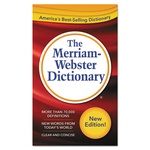 The Merriam-Webster Dictionary
The Merriam-Webster Dictionary
$9.95
The Merriam-Webster Dictionary - New Edition -(2016) Paperback dictionary is a handy, reliable, and authoritative reference for words most frequently used in English. Reference tool offers more than 65,000 entries, 75,000 definitions, 2,000 new entries, 150 illustrations, a Handbook of Style and quick-reference data tables. Paperback dictionary contains 939 pages .
ISBN-10: 087779930XISBN-13: 978-087779930
Read more
 Roget's Thesaurus
Roget's Thesaurus
$9.95
709 pages. Ballantine (2001). This is an authoritative, comprehensive, and easy-to-use thesaurus favored by writers and students alike. * One simple alphabetical listing * More than 11,000 main entries * More than 200,000 synonyms and antonyms * Sample sentences for every main entry * Parts of speech shown for every main entry, synonym, and antonym * Extensive coverage of all levels of vocabulary and usage, with informal and slang words identified * Edited and designed for easy access * All entries edited to help in vocabulary building The Random House imprint has long stood for excellence in the reference field. Random House reference books--prepared by its permanent lexicographic staff with the assistance of many hundreds of scholars, educators, and specialists--have been widely acclaimed for their outstanding quality and usefulness.
ISBN-10: 0345447263 ISBN-13: 978-0345447265
Read more
 Webster's Spanish-English English-Spanish Dictionary
Webster's Spanish-English English-Spanish Dictionary
$15.95
Paperback: 694 pages. Publisher: Random House. From the publisher: Now in a revised and updated second edition, Random House's best-selling bilingual dictionary is ideal for students, business people and travelers. Pronunciations are shown for Spanish and English, with detailed guides to the pronunciation of both languages. It provides International Phonetic Alphabet (IPA) pronunciations for Spanish and English, through coverage of general and specialized vocabulary, and many new words and meanings, such as movil/celular (cellular phone), buscapersonas/bip (pager), biodiversidad (biodiversity), ciberspacio (cyberspace) and hoja doe calculo (spreadsheet). This comprehensive and easy-to-use reference includes: Over 145,000 definitions of words and phrases European and Western Hemisphere Spanish Guides to pronunciation of Spanish and English American English spelling and vocabulary The most current Spanish spellings, reflecting the alphabetization rules of the Spanish language academics Written by David L. Gold
ISBN-10: 0375721967 ISBN-13: 978-0375721960
Read more
 The Blue Book of Grammar and Punctuation
The Blue Book of Grammar and Punctuation
$19.99
110 pages. Jossey-Bass (10th Edition, 2007). The mysteries of grammar are revealed! This self-teaching guide covers all aspects of grammar and punctuation by an educator with experience teaching English skills to prisoners. An easy-to-use reference guide as well as a workbook are included.
ISBN-10: 0966722183 ISBN-13: 978-0966722185
Read more
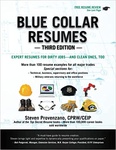 Blue Collar Resumes, Third Edition
Blue Collar Resumes, Third Edition
$16.95
Blue Collar Resumes, Third Edition will help you discover, organize, and market your skills and abilities to employers with impact and clarity. Using real-life examples and the latest strategies used by expert resume writers, Steven Provenzano, CPRW/CEIP, clearly explains how to sift through your work history, extract and develop key points about your talents, and sell them to win interviews. You'll learn to evaluate your work experience, education and skills, and translate them into powerful selling points. You will also learn new, effective methods to format and organize your achievements, design the finished resume, and leverage new techniques for making job contacts and acing the interview.
The 100+ resume examples in Blue Collar Resumes, Third Edition, reflect a broad spectrum of industries, careers, and job descriptions. These include skilled trade and factory workers, assemblers and construction workers, supervisors, executive secretaries, sales and customer service representatives, data entry clerks, and clerical positions. There's even resume samples for pilots, drivers and equipment operators, technical and medical workers, as well as entry-level business and administrative positions, and veterans returning to the workforce. No matter what your or type of work this guide will help you shorten your job search and increase your income!
Read more
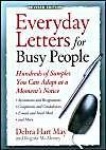 Everyday Letters for Busy People: Hundreds of Samples You Can Adapt at a Moment's Notice
Everyday Letters for Busy People: Hundreds of Samples You Can Adapt at a Moment's Notice
$21.99
287 pages. Career Press (2004). Here are hundreds of tips, techniques, and samples that will help you create the perfect letter (or e-mail!) no matter what the occasion or circumstance, or how little time you have. In no time, you'll be writing the kind of letters that get action, build relationships, ease tense situations, and get your message across. This book includes a wide variety of sample letters you can use or adapt at a minute's notice, with: Business letters; Complaint letters; Community action letters; Job-search letters; Letters to government officials and agencies; Thank-you letters. This book also includes a new section on how to write concise, polite, and effective e-mails easier and faster than ever! It will help you to create the sharpest interview follow-up, the kindest thank you, the most heartfelt condolence, and the most effective complaint letter.
ISBN-10: 1564147126 ISBN-13: 978-1564147127
Read more
 Beyond Bars, Rejoining Society After Prison
Beyond Bars, Rejoining Society After Prison
$14.95
Jeffrey Ian Ross, Ph.D. and Stephen C. Richards, Ph.D.
An essential resource for former prisoners and their families post-incarceration. The United States has the largest criminal justice system in the world, with currently over 7 million adults and juveniles in jail, prison, or community custody. Because they spend enough time in prison to disrupt their connections to their families and their communities, they are not prepared for the difficult and often life-threatening process of reentry. As a result, the percentage of these people who return to a life of crime and additional prison time escalates each year. Beyond Bars is the most current, practical, and comprehensive guide for ex-convicts and their families about managing a successful reentry into the community and includes: ·Tips on how to prepare for release while still in Prison ·Ways to deal with family members, especially spouses and children ·Finding a job ·Money issues such as budgets, bank accounts, taxes, and debt ·Avoiding drugs and other illicit activities ·Free resources to rely on for support
ISBN-10: 1592578519ISBN-13: 978-1592578511
Read more
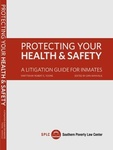 Protecting Your Health and Safety: A Litigation Guide For Inmates
Protecting Your Health and Safety: A Litigation Guide For Inmates
$10.00
325 pages. Written by Robert E. Toone; edited by Daniel Manville. Southern Poverty Law Center (2nd Edition, 2009). The murky waters of prisoner self-representation just got a little easier to navigate with the arrival of the second edition of Protecting Your Health & Safety, A Litigation Guide For Inmates. Published by the Southern Poverty Law Center and distributed by PLN, Protecting Your Health & Safety is an easy to read, plain language guide prisoners can use to identify and litigate federal civil rights claims against prison officials. Written by Robert E. Toone and edited by PLN columnist Daniel Manville, Protecting Your Health & Safety dedicates over 100 pages to the different kinds of constitutional and statutory violations prisoners frequently encounter while incarcerated. Topics discussed include the First to Fourteenth Amendments, the Religious Freedom Restoration Act, the Religious Land Use and Institutionalized Persons Act, the Americans with Disabilities Act, and the Rehabilitation Act. Each issue, whether it may be First Amendment retaliation or a violation of the Equal Protection Clause, is addressed in laymen’s terms and supported by case citations from federal district courts, federal courts of appeal, and the United States Supreme Court. Difficult concepts like deliberate indifference are simplified in just seven pages, giving you what you need to know to make out a cognizable Eighth Amendment claim. Protecting Your Health & Safety does not stop at helping identify potential wrongs, though. Rather, with its over 130 page discussion on how to write a complaint, seek in forma pauperis status, ask for appointment of counsel, respond to motions to dismiss, respond to motions for summary judgment, conduct discovery, and even present your case at trial, Protecting Your Health brings you to the finish line. Even procedural issues such as exhaustion of administrative remedies are addressed, helping you avoid dismissal at the pleading stage. A glossary of commonly used legal terms is also included, along with a directory of addresses where to file your federal civil rights suit in each judicial district. In all, the second edition of Protecting Your Health & Safety is a well written, must buy, for any serious prisoner litigant. Updated by Dan Manville this is the new, 2009 edition of the book and replaces earlier versions.
Read more
 Jailhouse Lawyers: Prisoners Defending Prisoners v. the U.S.A.
Jailhouse Lawyers: Prisoners Defending Prisoners v. the U.S.A.
$18.95
286 pages. By Mumia Abu-Jamal. City Lights Publishers (2009). In Jailhouse Lawyers, Prison Legal News columnist, award-winning journalist and death-row prisoner Mumia Abu-Jamal presents the stories and reflections of fellow prisoners-turned-advocates who have learned to use the court system to represent other prisoners—many uneducated or illiterate—and in some cases, to win their freedom. In Mumia's words, "This is the story of law learned, not in the ivory towers of multi-billion-dollar endowed universities [but] in the bowels of the slave-ship, in the hidden, dank dungeons of America … It is law learned in a stew of bitterness, under the constant threat of violence, in places where millions of people live, but millions of others wish to ignore or forget. It is law written with stubs of pencils, or with four-inch-long rubberized flex-pens, with grit, glimmerings of brilliance, and with clear knowledge that retaliation is right outside the cell door. It is a different perspective on the law, written from the bottom, with a faint hope that a right may be wronged, an injustice redressed. It is Hard Law." Mumia Abu-Jamal is author of many books, including Live From Death Row, Death Blossoms, All Things Censored, and We Want Freedom. He has been living on death row in a Pennsylvania prison since 1982. Praise for Jailhouse Lawyers: "Jailhouse Lawyers is a must-read for everyone connected in any fashion to the criminal justice system. It illuminates a dark area seen by few and outlines the legal battles still waged from the "hole" by the semantic warriors who inhabit it. The book plumbs the depth of man's inhumanity to man by exploring the ongoing legal attack by underground lawyers on an unfair legal system. Death-row prisoner Mumia Abu-Jamal, an award winning journalist, once again demonstrates his courage in opposing the oppression of prison existence." —Tony Serra "[Mumia Abu-Jamal] is one of the most important public intellectuals of our time…. Jailhouse Lawyers is a persuasive refutation of the ideological underpinnings of the Prison Litigation Reform Act (PLRA). The way he situates the PLRA historically—as an inheritance of the Black Codes, which were themselves descended from the slave codes—allows us to recognize the extent to which historical memories of slavery and racism are inscribed in the very structures of the prison system and have helped to produce the prison-industrial-complex. Mumia Abu-Jamal has once more enlightened us, he has once more offered us new ways of thinking about law, democracy, and power. He allows us to reflect upon the fact that transformational possibilities often emerge where we least expect them." —Angela Y. Davis, from the foreword
ISBN-10: 0872864693 ISBN-13: 978-0872864696
Read more
 Federal Prison Handbook
Federal Prison Handbook
$74.95
490 pages. Middle Street Publishing
The Federal Prison Handbook, by Christopher Zoukis, is the definitive guide to surviving incarceration in a federal prison. This handbook teaches individuals facing incarceration, prisoners who are already inside, and their friends and family everything they need to know to protect themselves and their rights. The thorough information was compiled by someone who has first-hand experience with the federal prison system, as Zoukis is an advocate currently serving time at a federal prison. His insider’s view of this unknown world guides inmates through the mental stresses of confinement.
In detailed chapters broken down by topical areas, readers discover:
What to expect on the day you’re admitted to prison, and how to greet cellmates for the first time
What to do about sexual harassment or assault
The best ways to avoid fights, and the options that provide the greatest protection if a fight cannot be avoided
Medical, psychological and religious services
How to communicate with the outside world through telephones, computers and mail.
What you can buy in the official commissary and the underground economy
How to avoid scams, schemes, theft, and other problems
Comprehensive analysis of Federal Bureau of Prisons policy and regulatory guidelines
And much more!
Importantly, this text provides detailed instructions on how prisoners can protect their rights. The author is a college-educated prisoner who has fought extensively to preserve his rights and the rights of other prisoners.
ISBN-10: 0692799737
ISBN-13: 9780692799734
Read more
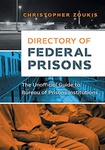 Directory of Federal Prisons: The Unofficial Guide to Bureau of Prisons Institutions
Directory of Federal Prisons: The Unofficial Guide to Bureau of Prisons Institutions
$99.95
The Directory of Federal Prisons is the most comprehensive guidebook to Federal Bureau of Prisons facilities on the market. Not simply a directory of information about each facility, this book delves into the shadowy world of American federal prisoners and their experiences at each prison, whether governmental or private.What sets the Directory of Federal Prisons apart from other prison guidebooks is the first-hand validation of information. Most prison directories provide basic information that is publicly available (e.g., security level, population number, location, etc.). This book is different.While basic data is included, hundreds of current federal inmates have been surveyed and interviewed in order to ascertain the culture of each institution. This enables the Directory of Federal Prisons to provide information such as the level of violence; whether sex offenders, informants, or LGBT inmates can walk the yard; the status of prison politics and organized gangs; and what prisoners believe is good and bad about each facility. This intelligence is much more important to understanding each prison and the experience therein than basic directory types of information.The Directory of Federal Prisons also includes a detailed discussion of the custody and classification system used by the Bureau of Prisons. This system determines how inmates are scored for security level and prison placement. Readers can use real Bureau of Prisons' case management forms to ascertain an actual security score, thereby taking the guesswork out of security levels, housing determinations, prison transfers, and how Public Safety Factors and Management Variables impact placement decisions. This is knowledge that only seasoned case managers tend to have.In each facility profile, you will learn:-Basic data such as the sex of the inmate population, security level, and medical and mental health care levels.-Physical location and inmate mailing address.-Educational, psychological, vocational, and recreation programs available.-Notable incidents reported by the media (e.g., arrests, riots, significant fights, escapes, etc.).-Reviews by inmates currently at each facility, including information about violence, prison politics, who can walk each yard, and more.-And much more!No one wants to spend time in a federal prison, but if you or a loved one must go, finding quality, reliable information about life on the inside is essential to a safe and productive stay. The Directory of Federal Prisons builds off the award-winning and bestselling Federal Prison Handbook's reputation as the leading federal prison survival guide. Not only will readers be able to understand all facets of prison life and how to remain safe, they will also be able to evaluate each federal prison and its offerings, know if it is safe to walk the yard, and better evaluate and understand transfer options so that they can make the right prison placement decisions the first time.
Read more
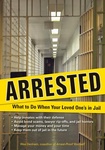 Arrested: What to Do When Your Loved One’s in Jail
Arrested: What to Do When Your Loved One’s in Jail
$16.95
263 Pages. By Wes Denham. Sound advice for friends and relatives of those recently incarcerated Whether a defendant is charged with misdemeanor disorderly conduct or first-degree murder, this is an indispensable guide for those who want to support family members, partners, or friends facing criminal charges. Draining away the confusion by explaining legal proceedings and jail procedures, it identifies common bond scams and lawyer rip-offs and helps organize inmates to assist in their legal defense. In addition to the most common legal motions, challenges, and investigations, this resource also provides additional coverage on how to avoid fights, sex, gambling, and scams that can result in injury while in jail and cause additional criminal charges to be filed. Detailed budgeting forms to calculate the true, multiyear costs of legal defense—all the way through the years of probation, parole, and reentry into society—are also included.
ISBN-10: 1556528345ISBN-13: 978-1556528347
Read more
 Arrest-Proof Yourself, Second Edition
Arrest-Proof Yourself, Second Edition
$16.95
Paperback: 376 pages. 2nd edition. Dale C. Carson, Wes Denham. What do you say if a cop pulls you over and asks to search your car? What if he gets up in your face and uses a racial slur? What if there’s a roach in the ashtray? And what if your hot-headed teenage son is at the wheel? If you read this book, you’ll know exactly what to do and say.
More people than ever are getting arrested—usually for petty offenses against laws that rarely used to be enforced. And because arrest information is so easily available via the Internet, just one little arrest can disqualify you from jobs, financing, and education.
This eye-opening book tells you everything you need to know about how cops operate, the little things that can get you in trouble, and how to stay free from the hungry jaws of the criminal justice system. It is now updated with new and important information on the right of the police to search your car; on guns, knives, and self-defense; and on changes in surveillance methods. Chicago Review Press
ISBN-10: 1613748043 ISBN-13: 978-1613748046
Read more
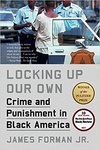 Locking Up Our Own: Crime and Punishment in Black America
Locking Up Our Own: Crime and Punishment in Black America
$19.95
by James Forman Jr. 306 Pages
Farrar, Straus and Giroux
"Locking Up Our Own is an engaging, insightful, and provocative reexamination of over-incarceration in the black community. James Forman Jr. carefully exposes the complexities of crime, criminal justice, and race. What he illuminates should not be ignored." ―Bryan Stevenson, author of Just Mercy and founder of the Equal Justice Initiative"A beautiful book, written so well, that gives us the origins and consequences of where we are . . . I can see why [the Pulitzer prize] was awarded." ―Trevor Noah, The Daily ShowFormer public defender James Forman, Jr. is a leading critic of mass incarceration and its disproportionate impact on people of color. In Locking Up Our Own, he seeks to understand the war on crime that began in the 1970s and why it was supported by many African American leaders in the nation’s urban centers.Forman shows us that the first substantial cohort of black mayors, judges, and police chiefs took office amid a surge in crime and drug addiction. Many prominent black officials, including Washington, D.C. mayor Marion Barry and federal prosecutor Eric Holder, feared that the gains of the civil rights movement were being undermined by lawlessness―and thus embraced tough-on-crime measures, including longer sentences and aggressive police tactics. In the face of skyrocketing murder rates and the proliferation of open-air drug markets, they believed they had no choice. But the policies they adopted would have devastating consequences for residents of poor black neighborhoods.A former D.C. public defender, Forman tells riveting stories of politicians, community activists, police officers, defendants, and crime victims. He writes with compassion about individuals trapped in terrible dilemmas―from the men and women he represented in court to officials struggling to respond to a public safety emergency. Locking Up Our Own enriches our understanding of why our society became so punitive and offers important lessons to anyone concerned about the future of race and the criminal justice system in this country.
ISBN: 978-037453744
Read more
 Caught: The Prison State and the Lockdown of American Politics
Caught: The Prison State and the Lockdown of American Politics
$28.95
Paperback, 496 pages. By Marie Gottschalk.
Princeton University Press (December 2014).
From The Publisher:
The huge prison buildup of the past four decades has few defenders today, yet reforms to reduce the number of people in U.S. jails and prisons have been remarkably modest. Meanwhile, a carceral state has sprouted in the shadows of mass imprisonment, extending its reach far beyond the prison gate. It includes not only the country's vast archipelago of jails and prisons but also the growing range of penal punishments and controls that lie in the never-never land between prison and full citizenship, from probation and parole to immigrant detention, felon disenfranchisement, and extensive lifetime restrictions on sex offenders. As it sunders families and communities and reworks conceptions of democracy, rights, and citizenship, this ever-widening carceral state poses a formidable political and social challenge.
In this book, Marie Gottschalk examines why the carceral state, with its growing number of outcasts, remains so tenacious in the United States. She analyzes the shortcomings of the two dominant penal reform strategies--one focused on addressing racial disparities, the other on seeking bipartisan, race-neutral solutions centered on reentry, justice reinvestment, and reducing recidivism.
In this bracing appraisal of the politics of penal reform, Gottschalk exposes the broader pathologies in American politics that are preventing the country from solving its most pressing problems, including the stranglehold that neoliberalism exerts on public policy. She concludes by sketching out a promising alternative path to begin dismantling the carceral state
From the Back Cover:
"This is the most comprehensive, synthetic, and compelling account of what is driving penal trends in America today. For contemporary scholars and activists, Caught is certain to become a common starting point for future debates about what direction policy reform and social activism should take."--Jonathan Simon, author of Governing through Crime: How the War on Crime Transformed American Democracy and Created a Culture of Fear
"[A]cademic but accessible, and it has an urgency to it. . . . A needed cry for justice."--Kirkus Reviews
ISBN-10: 0691164053
ISBN-13: 978-0691164052
Read more
 All Alone in the World: Children of the Incarcerated
All Alone in the World: Children of the Incarcerated
$19.95
303 pages. By Nell Bernstein.
A moving condemnation of the U.S. penal system and its effect on families" (Parents’ Press), award-winning journalist Nell Bernstein takes an intimate look at parents and children—over two million of them—torn apart by our current incarceration policy.
ISBN-10: 1595581855ISBN-13: 978-159558185
Read more
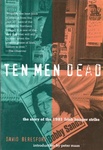 Ten Men Dead: The Story of the 1981 Irish Hunger Strike
Ten Men Dead: The Story of the 1981 Irish Hunger Strike
$16.95
334 pages. By David Beresford. Atlantic Monthly Press. Relies on secret IRA documents and letters smuggled out from the IRA political prisoners during their 1981 hunger strike at the infamous Long Kesh prison in Belfast. From the Publisher: In 1981 ten men starved themselves to death inside the walls of Long Kesh prison in Belfast. While a stunned world watched and distraught family members kept bedside vigils, one "soldier" after another slowly went to his death in an attempt to make Margaret Thatcher's government recognize them as political prisoners rather than common criminals. Drawing extensively on secret IRA documents and letters from the prisoners smuggled out at the time, David Beresford tells the gripping story of these strikers and their devotion to the cause. An intensely human story, Ten Men Dead offers a searing portrait of strife-torn Ireland, of the IRA, and the passions - on both sides - that Republicanism arouses.
ISBN-10: 087113702X ISBN-10: 978-0871137029
Read more
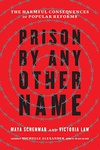 Prison by Any Other Name: The Harmful Consequences of Popular Reforms
Prison by Any Other Name: The Harmful Consequences of Popular Reforms
$29.95
by Victoria Law 295 Pages
The New Press
A crucial indictment of widely embraced “alternatives to incarceration” that exposes how many of these new approaches actually widen the net of punishment and surveillance
“But what does it mean—really—to celebrate reforms that convert your home into your prison?”—Michelle Alexander, from the foreword
Electronic monitoring. Locked-down drug treatment centers. House arrest. Mandated psychiatric treatment. Data-driven surveillance. Extended probation. These are some of the key alternatives held up as cost-effective substitutes for jails and prisons. But many of these so-called reforms actually widen the net, weaving in new strands of punishment and control, and bringing new populations, who would not otherwise have been subject to imprisonment, under physical control by the state.
As mainstream public opinion has begun to turn against mass incarceration, political figures on both sides of the spectrum are pushing for reform. But—though they’re promoted as steps to confront high rates of imprisonment—many of these measures are transforming our homes and communities into prisons instead.
In Prison by Any Other Name, activist journalists Maya Schenwar and Victoria Law reveal the way the kinder, gentler narrative of reform can obscure agendas of social control and challenge us to question the ways we replicate the status quo when pursuing change. A foreword by Michelle Alexander situates the book in the context of criminal justice reform conversations. Finally, the book offers a bolder vision for truly alternative justice practices.
ISBN: 978-162097310
Read more
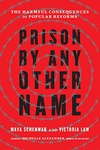 Prison by Any Other Name: The Harmful Consequences - Paperback
Prison by Any Other Name: The Harmful Consequences - Paperback
$19.95
by Victoria Law 295 Pages
The New Press
A crucial indictment of widely embraced “alternatives to incarceration” that exposes how many of these new approaches actually widen the net of punishment and surveillance
“But what does it mean—really—to celebrate reforms that convert your home into your prison?”—Michelle Alexander, from the foreword
Electronic monitoring. Locked-down drug treatment centers. House arrest. Mandated psychiatric treatment. Data-driven surveillance. Extended probation. These are some of the key alternatives held up as cost-effective substitutes for jails and prisons. But many of these so-called reforms actually widen the net, weaving in new strands of punishment and control, and bringing new populations, who would not otherwise have been subject to imprisonment, under physical control by the state.
As mainstream public opinion has begun to turn against mass incarceration, political figures on both sides of the spectrum are pushing for reform. But—though they’re promoted as steps to confront high rates of imprisonment—many of these measures are transforming our homes and communities into prisons instead.
In Prison by Any Other Name, activist journalists Maya Schenwar and Victoria Law reveal the way the kinder, gentler narrative of reform can obscure agendas of social control and challenge us to question the ways we replicate the status quo when pursuing change. A foreword by Michelle Alexander situates the book in the context of criminal justice reform conversations. Finally, the book offers a bolder vision for truly alternative justice practices.
ISBN: 978-162097697
Read more
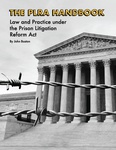 The PLRA Handbook (Prisoners Pricing)
The PLRA Handbook (Prisoners Pricing)
$84.99
This is pricing for prisoners. Please click this link for the professionals (lawyers, prison libraries, law firms, etc.).
By John Boston
The PLRA Handbook is the best and most thorough guide to the PLRA in existence and provides an invaluable roadmap to all the complexities and absurdities it raises to keep prisoners from getting rulings and relief on the merits of their cases. The goal of this book is to provide the knowledge prisoners’ lawyers – and prisoners, if they don’t have a lawyer – need to quickly understand the relevant law and effectively argue their claims.
Anyone involved in federal court prison and jail litigation needs The PLRA Handbook – lawyers, judges, court staff, academics, and especially, pro se litigants.
Although the PLRA Handbook is intended primarily for litigators contending with the barriers the PLRA throws up to obtaining justice for prisoners, it’ll be of interest and informative for anyone wishing to learn how the PLRA has been applied by the courts and how it has impacted the administration of justice for prisoners. It is based primarily on an exhaustive review of PLRA case law and contains extensive citations.
John Boston is best known to prisoners around the country as the author, with Daniel E. Manville, of the Prisoners’ Self-Help Litigation Manual – commonly known as the “bible” for jailhouse lawyers and lawyers who litigate prison and jail cases. He is widely regarded as the foremost authority on the PLRA in the nation.
“If prisoners will review The PLRA Handbook prior to filing their lawsuits, it is likely that numerous cases that are routinely dismissed will survive dismissal for failure to exhaust.”
— Daniel E. Manville, Director, Civil Rights Clinic
Read more
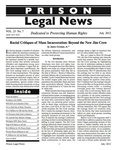 Prison Legal News Magazine
Choose option »
Prison Legal News Magazine
Choose option »
Monthly print magazine, covering criminal justice-related news and litigation nationwide, published since 1992.
 Digital Access
Choose option »
Digital Access
Choose option »
Access the full library of legal briefs, issues, articles, and cases on this website.

